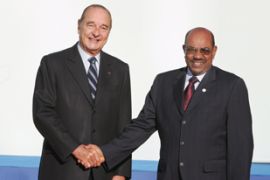Chad: Sudan talks ‘useless’
Khartoum accused of attacks as Chriac calls Darfur a “humanitarian disaster”.

He called on “all the belligerents and the government of Sudan … to agree to the deployment of a peace force, to cease the attacks, to protect the civilian population and humanitarian workers”.
Rival accusations
Sudanese President Omar al-Bashir and representatives from Chad and Central African Republic were to meet during the summit on Thursday for talks on Darfur later Thursday, according to an official from Chirac’s office.
Violence in Darfur has spilled over into neighbouring Chad and Central African Republic, both of which blame Khartoum for the attacks.
Sudan accuses Chad of backing Darfur rebels, while Chad says Sudan is backing Chadian rebels trying to overthrow Idriss Deby, the country’s president, and giving them sanctuary in Darfur.
Allam-Mi dismissed the proposed talks off-handedly and told reporters “We are not in Cannes to entertain the crowd.”
Estimates put the number of people killed in the four-year conflict in Darfur at 200,000 with a further 2.5 million driven from their homes, many of them into Chad.
Rebel yes
Elsewhere Darfur rebels said on Thursday they will respect a ceasefire and are willing to go back to the negotiating table after a meeting with UN and African Union envoys.
Jan Eliasson, the UN envoy for Darfur and his AU counterpart, Salim Ahmed Salim, on Wednesday met rebel commanders in Darfur who rejected a May 2006 peace deal.
| “We are not in Cannes to entertain the crowd”
Ahmat Allam-Mi, Foreign minister of Chad |
“We will respect the … ceasefire and … once we have our commanders conference we will attend peace negotiations,” Jar el-Neby said.
Neby represents one of the largest of the around a dozen rebel factions.
Commanders who rejected the May peace deal say they want more political representation, compensation for war victims and a role in disarming the militia known as Janjaweed, accused of the some of the worst atrocities.
Only one of three rebel negotiating factions signed the 2006 deal.
The rebels have since fragmented into numerous factions and a conference to try and unite their position has been delayed many times, twice because of government bombardment. It is due to begin on February 19.
Relief in the south
While violence continues in the region a ceasefire has been holding in the south of Sudan, signed in 2005 following years of ethnic conflict but peace has brought little relief for many refugees.
Al Jazeera’s John Cookson visited a clinic run by the human rights group, Islamic relief, in Warrap near the town of Waw.
Forced to serve an area of 600,000 people, the clinic is the only one in the area.
Hany el Banna from Islamic Relief says he wants the international community to realise the agony of these people and their suffering. They do not have clean water, they don’t have proper housing, they don’t have proper food. They don’t have anything and nobody is talking about it.”
But while the peace process falters further north in Sudan the Muslim-funded clinic is trying to heal old wounds from a civil war that broadly split Sudan between a Muslim north and Christian south.
Deng Arieny, a former rebel says the Warrap community now knows there is no difference between Muslim and Christian because a Muslim project has come and helped a Christian community in abject poverty.